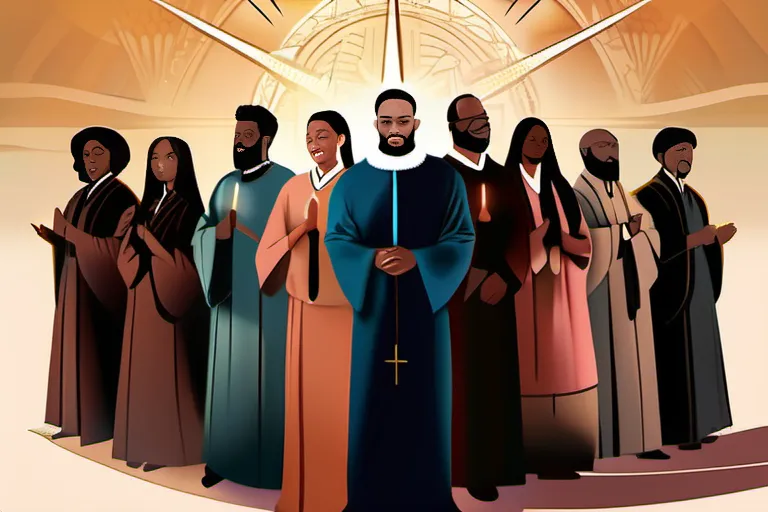Explore the fundamental beliefs that shape the lives and teachings of influential Christian leaders throughout history.
This article delves into the core beliefs that have defined the lives and teachings of prominent Christian leaders. From Jesus Christ to modern-day pastors, we’ll examine their beliefs, their impact, and how these beliefs continue to shape Christianity today.
The Foundational Beliefs of Jesus Christ
The Foundational Beliefs of Jesus Christ: Explore the core teachings of Jesus Christ, including his message of love, forgiveness, and the importance of faith.
Imagine walking along a dusty road in ancient Palestine, hearing the words of a man who spoke with authority and compassion. This was Jesus Christ, whose teachings have shaped not only Christianity but also much of Western culture. But what exactly did Jesus teach? How can we understand his message in a way that resonates even today?
At its core, the teachings of Jesus revolve around a few key beliefs: love, forgiveness, and faith. Love is perhaps the most universal concept; it’s the golden rule that ‘Do unto others as you would have them do unto you.’ (Matt 7:12). But Jesus took this a step further by saying, ‘Love your enemies and pray for those who persecute you.’ (Matt 5:44). This is like extending a hand to someone who has tripped and fallen; it’s a gesture that goes beyond mere courtesy.
Forgiveness is another fundamental aspect of Jesus’ teachings. He said, “Forgive us our debts, as we also have forgiven our debtors.” (Matt 6:12). This means letting go of grudges and moving forward, much like planting a new seed in the soil to allow it to grow and flourish rather than leaving it buried under resentment.
Finally, faith is central to Jesus’ message. He proclaimed, “Truly I tell you, unless you change and become like little children, you will never enter the kingdom of heaven.” (Matt 18:3). This suggests that true faith requires a humble heart, one that is open and receptive to divine guidance.
Understanding these beliefs can help us grasp the essence of Jesus’ message. They are not just abstract ideas but practical guides for living a life filled with compassion and hope. As we delve deeper into the teachings of influential Christian leaders who followed in his footsteps, we’ll see how they have interpreted and applied these core principles to their own lives and teachings.
The Influence of the Early Church Fathers
Imagine stepping back into the vibrant and tumultuous world of early Christianity, where leaders like Paul, Peter, and Augustine played pivotal roles in shaping not just their faith but the very fabric of Western civilization. These individuals were more than just men; they were architects of belief, whose teachings and lives continue to influence Christian thought today.
Let’s delve into the core beliefs that guided these influential early church leaders. What sets Paul apart from his contemporaries? How did Peter lay the groundwork for the apostolic tradition? And what can we learn from Augustine’s deep introspection?
Paul, the Apostle to the Gentiles: Paul’s journey from persecutor of Christians to missionary is a testament to transformation and dedication. His belief in the atonement—the idea that Christ’s sacrifice on the cross pays for sins—is central to his teachings. By emphasizing this belief, Paul expanded Christianity beyond its Jewish roots to embrace a global audience.
- Peter’s Pillar of the Church: Peter, one of Jesus’ closest disciples, was appointed as the first bishop of Rome and became a rock on which Christ built His church. Through his letters and actions, Peter underscored the importance of community and unity among believers.
Augustine’s Transformation: Augustine’s conversion story is nothing short of miraculous. He shifted from a life of hedonism to a profound spiritual journey that led him to articulate complex theological concepts in clear, accessible terms. His belief in sola gratia—salvation by grace alone—challenged prevailing views and laid the groundwork for Reformation-era theology.
These leaders were not just passive observers; they were proactive architects of Christian doctrine. Their beliefs about grace, salvation, and community have endured through centuries, shaping the way Christians think and live today. By exploring their core beliefs, we can gain deeper insights into the development of Christianity and its enduring relevance.
As we journey through the lives and teachings of these early church leaders, let us ponder how their convictions might guide our own faith journeys in a world that often feels as complex and uncertain as the one they faced. Could there be lessons from their experiences that speak to us today?
Medieval Christian Leaders: The Age of Scholasticism
As we delve into the age of scholasticism, let us consider the pivotal role played by key medieval Christian leaders such as Thomas Aquinas, Anselm of Canterbury, and Hildegard of Bingen. These figures navigated a complex landscape where faith intertwined with reason, shaping much of what we understand about Christian thought today.
Imagine standing in the bustling markets of medieval Europe, surrounded by scholars poring over ancient texts. Among them was Anselm of Canterbury, whose mind was as sharp as the tools he used to craft theological arguments. Anselm’s famous ontological argument for God’s existence is like a riddle that challenges us: Can you conceive of the greatest possible being? If so, does not this entity exist in reality, too, making God necessary?
Next, let us turn our attention to Thomas Aquinas. Known as the “Angelic Doctor,” his work synthesizes Aristotelian philosophy and Christian theology. In his Summa Theologica, he offers a detailed exploration of faith and reason, much like a mosaic where each piece fits perfectly into the whole. His articulation of natural law theory is akin to finding a common thread that ties ethics to divine will, making it accessible yet profound.
Hildegard of Bingen stands out as a beacon of spiritual insight and visionary artistry. Her Sibylline Book and musical compositions are like the dawn breaking through the clouds, bringing light to often misunderstood spiritual truths. Hildegard’s holistic approach to faith, blending mysticism with natural sciences, challenges us to see beyond the physical world into a realm of divine revelation.
These medieval leaders, through their profound beliefs and teachings, laid the groundwork for much of Christian thought that followed. As we explore further in our journey, remember that their insights continue to resonate today, offering fresh perspectives on enduring questions of faith and morality. Who among us cannot be inspired by the clarity and depth of these voices from the past?
The Reformation: Martin Luther and John Calvin
Imagine standing at the edge of a turbulent sea, watching the waves of change crash against the shores of medieval Europe. In the early 16th century, a figure stepped forth like a lone beacon—Martin Luther. His actions and teachings were not just personal; they sparked a revolution that reshaped the religious landscape for centuries to come.
What was it that drove Martin Luther? Wasn’t he just another monk with a grievance against the Church? No, his beliefs ran deeper than surface grievances. He saw the heart of Christianity: grace through faith, as articulated in his famous thesis, ‘The Power and Efficacy of Christian Charity.’ This belief was not new, but Luther’s emphasis on it challenged the prevailing practices of indulgences and salvation by works.
From a theological standpoint, Luther’s ideas were like seeds sown into rich soil. But who cultivated this fertile ground? Enter John Calvin. Known for his influential work ‘Institutes of the Christian Religion,’ Calvin’s teachings became the foundation of what would later be called Reformed Protestantism. His doctrine of predestination and the sovereignty of God added another layer to the reformation.
Both Luther and Calvin shared a belief in the justification by faith alone, yet their approaches differed. Luther focused on personal salvation, while Calvin’s teachings were more systematic, addressing everything from church governance to personal conduct. These differences were not just academic; they had profound impacts on how communities of faith lived out their beliefs.
From this clash and synthesis emerged a new landscape: Protestantism. It wasn’t simply about breaking away but transforming the very fabric of religious life. The principles of these leaders—Luther’s emphasis on personal belief and Calvin’s structured doctrine—are still debated and discussed today, making them relevant even in our modern context.
So as we navigate through the history of Christian leadership, Martin Luther and John Calvin stand out not just for their time but for their timeless influence. Their beliefs continue to shape how Christians understand their faith, offering insights that resonate across centuries.
Modern Christian Leaders: A Diverse Landscape
Imagine stepping into the bustling city of Rome, where the Pope Francis‘s footsteps echo through time, echoing not just the traditions but also the voices of the marginalized and oppressed. How do his beliefs shape his approach to leadership? Is it a continuation of the reformist zeal seen in figures like Martin Luther or a unique path paved by his vision for church reform?
In contrast, travel across continents to the American South, where Billy Graham‘s powerful sermons resonate with millions. His teachings blend traditional Christian doctrine with a call for personal transformation and social justice. How do his beliefs intertwine with those of earlier leaders like John Calvin or Martin Luther? Do they offer new insights or revisit old debates?
Now, let’s venture into the world of modern media with Oprah Winfrey. Her success has transcended entertainment, making her a significant voice in contemporary society. How do her beliefs as a Christian leader differ from those of traditional clergy? Can we see parallels between her approach to leadership and that of other influential figures?
Each of these leaders—Pope Francis, Billy Graham, and Oprah Winfrey—represents a unique lens through which we can explore the diverse landscape of modern Christian leadership. Their beliefs reflect not only personal convictions but also the broader socio-cultural contexts in which they operate. How do their teachings and actions challenge or reinforce traditional Christian values?
As we delve into this exploration, one thing becomes clear: the core beliefs that shape these leaders are as varied as the challenges they face. Whether it’s advocating for social justice, preaching personal transformation, or leading through media influence, each leader brings a distinct voice to the conversation. What can we learn from their journeys and how might it inspire our own understanding of Christian leadership?
The Future of Christian Leadership
As we delve into the future of Christian leadership, it’s crucial to consider the challenges that lie ahead. How can modern Christian leaders navigate the complexities of our rapidly changing world while staying true to their core beliefs? Is there a way for them to innovate and adapt without losing their essence?
The landscape of Christianity is diverse, with various denominations and interpretations of faith. But as we look towards the future, one question looms large: How can Christian leaders foster unity in diversity? Can they find common ground that transcends denominational boundaries while still honoring their unique identities?
A key challenge for Christian leadership is engaging younger generations who are often more skeptical about traditional religious practices. How can leaders make faith relevant and appealing to those born into a digital age, where information flows at lightning speed and values evolve rapidly? Can they leverage technology in ways that enhance spiritual experiences without diluting the core message?
Another critical aspect is addressing social justice issues. Christian leaders must be at the forefront of advocating for marginalized communities and working towards systemic change. How can they balance their moral authority with practical action, ensuring that their influence extends beyond rhetoric to tangible impact? The world is watching, and the expectations are high.
The future of Christian leadership also hinges on interfaith dialogue. Can leaders from different religious backgrounds collaborate effectively, recognizing both differences and shared values? This could be a powerful way to promote peace and understanding in an increasingly polarized world. How can they lead by example, demonstrating that mutual respect and cooperation are not just nice ideals but essential for global harmony?
In summary, the future of Christian leadership involves navigating these multifaceted challenges with wisdom, compassion, and resilience. It requires a strategic blend of tradition and innovation, unity in diversity, engagement with new generations, commitment to social justice, and openness to interfaith collaboration. The path forward may not be straightforward, but by embracing these principles, Christian leaders can play a pivotal role in shaping a better future for all.
Conclusion
 By understanding the core beliefs of Christian leaders, we gain a deeper appreciation for the rich history and diversity within Christianity. This knowledge can help us navigate our own spiritual journeys and foster greater empathy and respect for others.
By understanding the core beliefs of Christian leaders, we gain a deeper appreciation for the rich history and diversity within Christianity. This knowledge can help us navigate our own spiritual journeys and foster greater empathy and respect for others.











